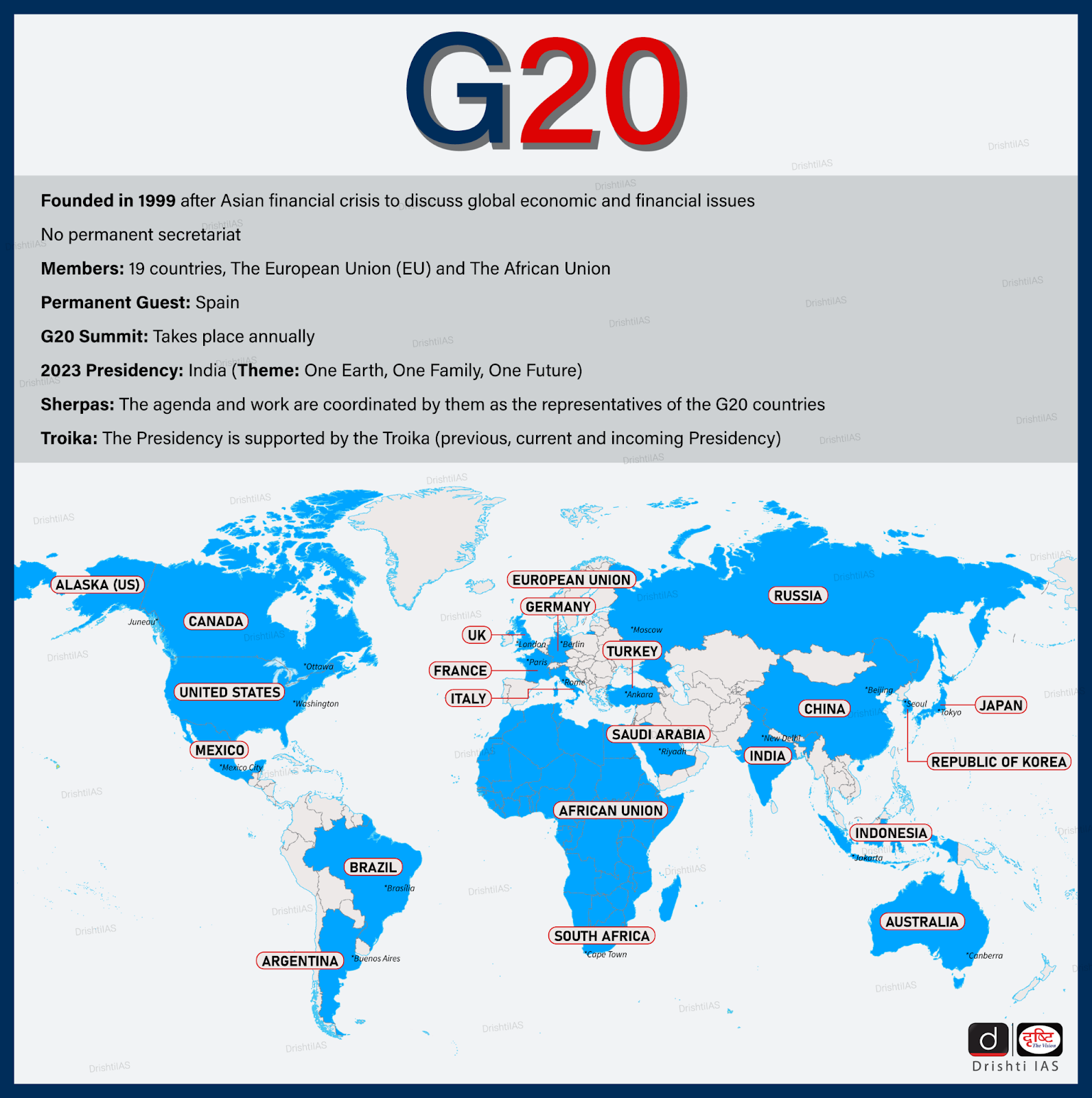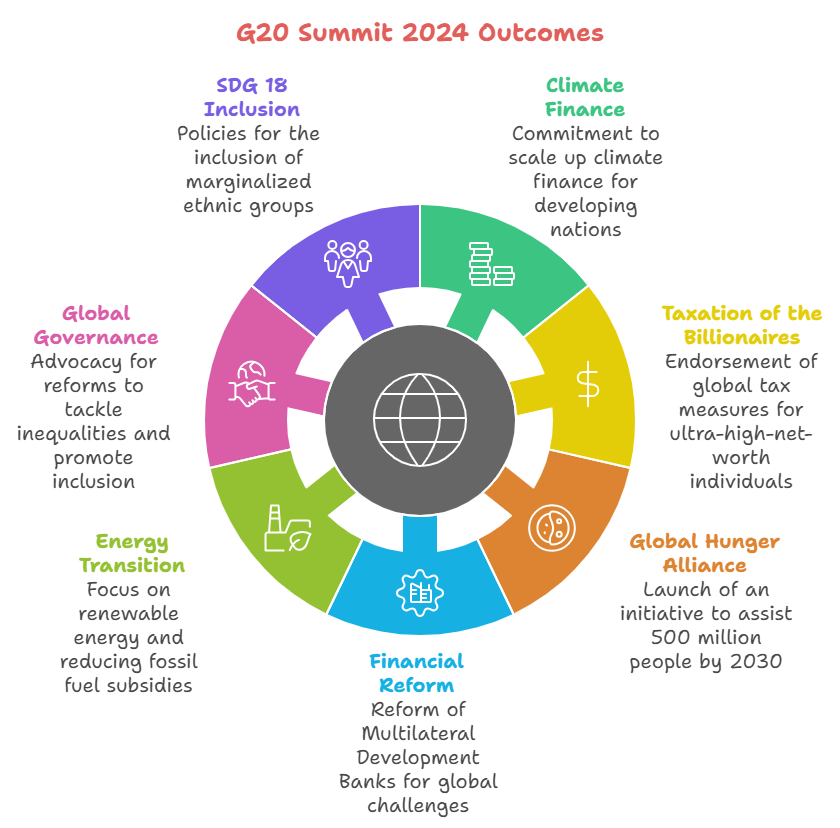International Relations
Perspective: G20 BRAZIL 2024
- 22 Nov 2024
- 13 min read
For Prelims: G20 Climate Finance, UNFCCC COP 30, COP29, Climate Change, Global Tax, National Sovereignty, Multilateral Development Banks (MDBs), Renewable Energy, Global Governance, Combating Hunger, Global Governance Reform, Middle East, Developing Nations, Trade Liberalization, Russia-Ukraine War, African Union, Global South, Middle East Tensions.
For Mains: Significance of G20 in Securing India’s Strategic Interest.
Why in News?
Recently, the G20 meeting concluded in Rio de Janeiro, highlighting core commitments such as taxation of billionaires, energy transition, and support for global climate initiatives, including UNFCCC COP 30 in Brazil.
- India addressed the G20 Summit highlighting the need for efforts to reduce poverty and strengthen global food security.
What are Major Outcomes of G20 Summit 2024?
- Climate Finance Commitment: The G20 recognized the urgent need to scale up climate finance “from billions to trillions”, but no concrete plan was established for the sources of this funding.
- Leaders supported COP29 in Azerbaijan and called for enhanced financing to help developing nations adapt to climate change, though consensus on the financial mechanisms remained elusive.
- Taxation of the Billionaires: A major achievement was the endorsement of measures to tax ultra-high-net-worth individuals.
- Brazil led the charge, with discussions about a global tax on the super-rich, though concerns about national sovereignty and tax principles were not fully resolved.
- Global Hunger and Poverty Alliance: The Task Force for a Global Alliance Against Hunger and Poverty, proposed by Brazil's G20 presidency, aims to create a Global Alliance to mobilize resources and knowledge for effective policies and social technologies to reduce hunger and poverty.
- The initiative was launched and gained support from 82 countries and aims to help 500 million people by 2030, marking a significant success for the G20 agenda, as it focuses on concrete social actions.
- Financial Reform and MDB Cooperation: The G20 reaffirmed the need to reform Multilateral Development Banks (MDBs) to better address global challenges, including climate change and poverty.
- Leaders agreed on strengthening cooperation within MDBs to ensure resources are effectively mobilized for high-impact projects.
- Energy Transition and Fossil Fuel Subsidies: The summit highlighted the need for continued investment in renewable energy and clean technologies but did not reaffirm the previous COP28 commitment to phase out fossil fuel subsidies.
- Emphasis was placed on reducing food loss and waste as part of broader climate action.
- Global Governance and Social Inclusion: The G20 called for reforms in global governance to address global inequalities.
- The G20 Social Summit culminated with declaration, emphasizing combating hunger, poverty, and inequality, advocating for sustainability, climate change action, just transition, and global governance reform, while highlighting tax justice and inclusive decision-making.
- Inclusion of Sustainable Development Goal 18 (SDG 18): A new SDG, focusing on ethnic-racial equality, was officially included as a key element among the G20 priorities.
- The goal addresses systemic discrimination and promotes policies for the social, economic, and political inclusion of marginalized ethnic groups. It aligns with the broader agenda of sustainable and equitable global development.
- Ukraine and Middle East Conflicts: The G20 supported initiatives for a comprehensive, just, and lasting peace in Ukraine, emphasizing diplomatic efforts, with members advocating for peace talks.
- Regarding the Middle East, the summit urged ceasefires in Gaza and Lebanon, focusing on the safe return of displaced people, the release of captives in Gaza, and providing humanitarian aid in Lebanon.
How does India’s Leadership Within the G20 Impact Global Issues?
- Championing Food Security: India has prioritized global food security, leveraging its expertise in agriculture and technology to mitigate food crises.
- Through the Millet Initiative during the 2023 G20 Summit in New Delhi, India promoted millets as climate-resilient crops, highlighting their potential to address global hunger and malnutrition.
- India has supported programs enhancing food supply chains and advocated for resilient agricultural practices.
- Reforming Multilateral Platforms: India has actively championed the reform of global multilateral platforms, including the United Nations and financial institutions like the IMF and World Bank.
- During its presidency, India called for greater inclusivity, pushing for the representation of developing nations in decision-making processes.
- The adoption of the G20 Roadmap for Multilateral Development Banks (MDBs) in 2023 was a key outcome influenced by India’s leadership.
- Supporting the Global South: India has emerged as a strong advocate for the Global South, amplifying its voice on critical issues such as sustainable development, climate finance, and equitable vaccine distribution.
- Through initiatives like the Voice of Global South Summit, India has ensured that the needs and priorities of developing nations remain central to the G20 agenda.
- India’s expertise in innovation and technology has been shared with developing nations to advance collaborative solutions in healthcare, education, and energy.
- Bilateral Talks and Strategic Partnerships: On the sidelines of the 2024 G20 Summit in Brazil, India held significant bilateral discussions with countries like Australia, Norway, Indonesia, Portugal, Italy, the UK, and France.
- These talks underscored India’s role in fostering strategic partnerships to address shared challenges and explore trade and investment opportunities.
- For instance, India-UK Free Trade Agreement (FTA) and extradition issues were discussed between India and UK, strengthening economic and judicial cooperation.
What are the Major Challenges Faced by the G20 Grouping?
- Global Hunger, Fuel, and Fertilizer Crisis: The G20 faces the challenge of addressing the intertwined global crises of global hunger, food insecurity, and rising fuel and fertilizer prices.
- Ongoing geopolitical conflicts, particularly the Russia-Ukraine war, have exacerbated food and fertilizer shortages, impacting developing nations.
- There is a significant gap in fulfilling commitments to food security and addressing the needs of vulnerable populations in the Global South.
- Geopolitical Rivalries Among Key Members: Political tensions, such as those between the United States and China or various geopolitical conflicts involving Russia and Israel, create significant barriers to consensus-building.
- The Russia-Ukraine war has sparked divisions within the G20, with conflicting views on sanctions and neutrality, highlighted by the recent U.S. decision to allow Ukraine to use long-range weapons inside Russia.
- These disputes frequently overshadow core global issues, shifting focus away from collaborative problem-solving.
- Divergent Economic and Political Priorities: The G20 encompasses a wide range of economies, from highly developed nations like the United States and Germany to developing ones like India and Brazil.
- Developed countries prioritize advanced technology, climate transitions, and geopolitical stability, while developing nations emphasize poverty alleviation, access to resources, and economic growth.
- These conflicting priorities often lead to disagreements on global issues such as climate financing, trade liberalization, and equitable resource allocation.
- Weak Enforcement Mechanisms: The G20, as an informal forum, produces ambitious plans and agreements, but its lack of a legally binding structure often results in a disconnect between commitments and execution, relying on voluntary pledges from member states.
- Agreements, such as those on climate finance or debt restructuring, often remain unimplemented due to the lack of accountability frameworks.
- Inadequate Representation of Global South: While the G20 includes emerging economies like India, South Africa, and Brasil, smaller and less-developed nations are not directly represented.
- Although initiatives like including the African Union as a member aim to address this gap, decision-making is still dominated by larger economies, limiting the influence of the Global South.
- This imbalance leads to criticisms that the G20 does not adequately prioritize the concerns of poorer nations, such as debt relief and equitable development.
Way Forward
- Addressing Global Hunger, Fuel, and Fertilizer Crisis: G20 nations must enhance collaboration with international organizations to ensure a united response to food, fuel, and fertilizer shortages, particularly in developing regions.
- For instance, the Global Hunger and Poverty Alliance and the Millet Initiative serve as key examples of G20 efforts aimed at addressing food insecurity and promoting sustainable agriculture to combat global hunger and poverty.
- The G20 should invest in long-term solutions, such as sustainable farming and alternative fertilizers, to reduce global dependence on unstable supply chains.
- Inclusive Dialogues: The G20 should prioritize inclusive dialogues focusing on shared global goals, balancing climate action and economic growth.
- Clear frameworks for climate finance and trade should be developed to address diverse economic needs.
- Diplomatic Engagement: The G20 should encourage diplomatic engagement and multilateral dialogue, focusing on conflict resolution.
- Creating specialized working groups could help build consensus on issues like the Russia-Ukraine conflict and Middle East tensions.
- Strengthening Enforcement Mechanisms: The G20 must strengthen accountability frameworks, using monitoring bodies and independent assessments to ensure climate finance and debt relief pledges are implemented.
- Partnerships with multilateral institutions can aid in improving enforcement.
- Enhancing Representation of Global South: The G20 should broaden membership to include more Global South nations, ensuring greater representation in decision-making.
- Special advisory roles for underrepresented nations could improve input on debt relief and climate justice.
UPSC Civil Services Examination, Previous Year Question (PYQ)
Prelims:
Q. In which one of the following groups are all the four countries members of G20? (2020)
(a) Argentina, Mexico, South Africa and Turkey
(b) Australia, Canada, Malaysia and New Zealand
(c) Brazil, Iran, Saudi Arabia and Vietnam
(d) Indonesia, Japan, Singapore and South Korea
Ans: (a)
Q. With reference to the “G20 Common Framework”, consider the following statements (2022)
- It is an initiative endorsed by the G20 together with the Paris Club.
- It is an initiative to support Low Income Countries with unsustainable debt.
Which of the statements given above is/are correct?
(a) 1 only
(b) 2 only
(c) Both 1 and 2
(d) Neither 1 nor 2
Ans: (c)








